ENCEPHALON
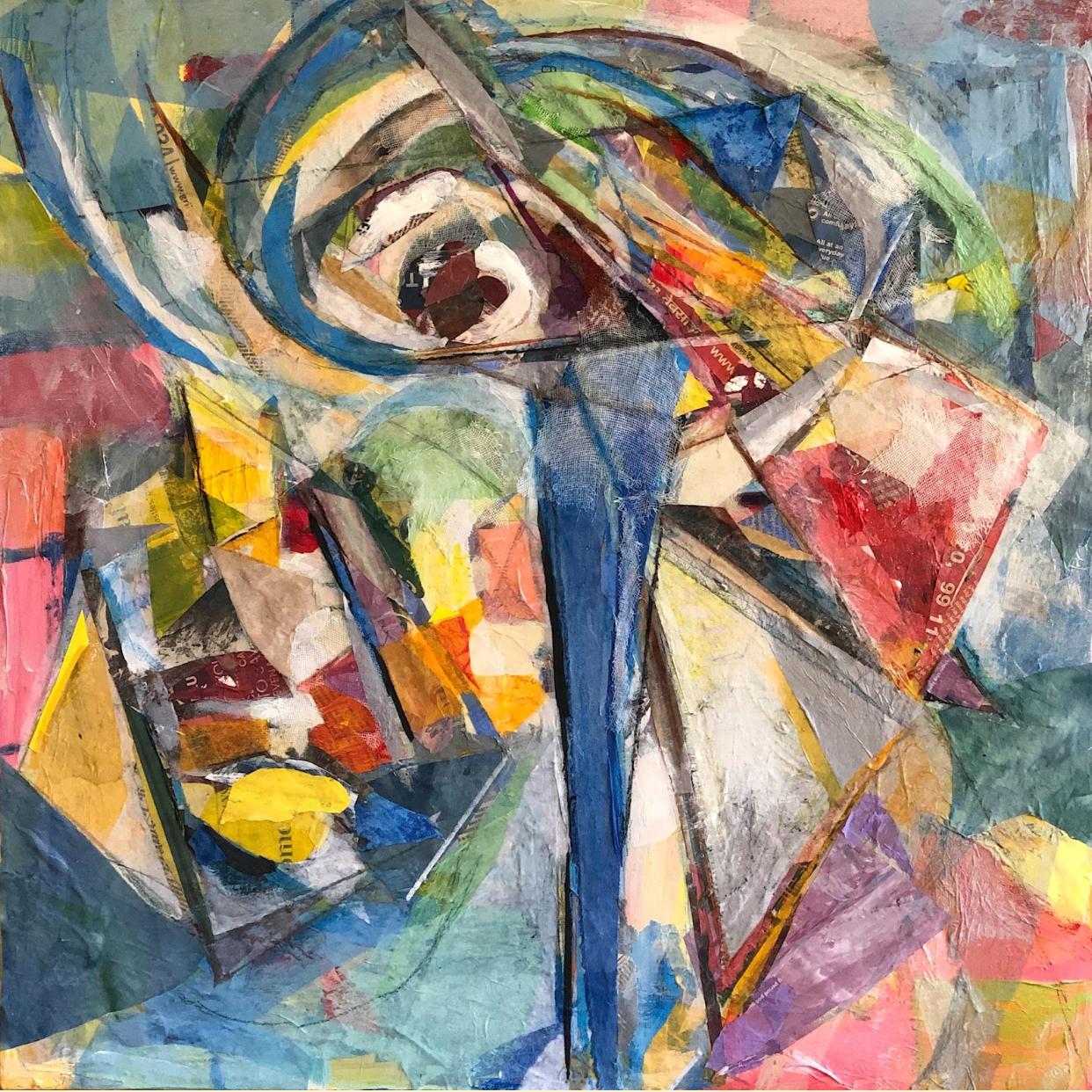
Art & Neuroscience Journal
Encephalon
Art & Neurosciencecience Journal 2024
Encephalon is a youth-led journal at the intersection of art and science. We are devoted to publishing and honoring the voice, originality, and craft of aspiring writers, artists, and scientists worldwide ©2024

get lost
Dorian Winter don’t
Editors

Cover Art
MASTHEAD
Norah Nguyen
Isabelle Iloreta
Anshi Purohit
Sonja Xie
Jasleen Bajaj
GJ Gillespie
Windmills of Your Mind
C O N T E N T S GJ Gillespie | Heroes and Villains Irina Tall | Untitled Cyrus Carlson | Press Michael Noonan | Light On Water Erika Salvador | My Memory Mural Rachel Coyne | Reflect GJ Gillespie | Fresco #3 Tanya Rastogi | Entropy of Art Christopher Woods | Sand Stairs Kirby Wright | Melancholia Raya Siddique | Protect Your Heart Lex Lee | Vulnerable 009 012 014 014 015 015 021 023 031 034 035 043
visuals
008 Scent | Dr. Michael Salcman 010 Watching the Watchmen | Alexandra Clemente 013 Moon River| Ann Huang 016 For Me, I Knew | Joel Sedano 018 Teacher of the Neurodivergent | Paul Benkendorfer 022 Descartes’ Error| Hadyn Adams 024 Generalismo | Thom Hawkins 032 Runs in the Family | Gerard Sarnat 033 Confessions | Parker Rose 036 Fruit Plate | Aradhya Saxena 032 Tentacles | Heather MacDonald 033 Bodies and Butterflies | Taiwo Hassan words C O N T E N T S
scent
Dr. Michael Salcman
Afterwards, I smell you like hot butter rising from my thighs, my hand pollinated with your musk, and the tack of your underclothes spouts lavender and lilies of the valley in my reptilian brain.
Furiously, I drive one-handed to my next stop, my fingers almost sticky with your smell, the last trace of your liquor in me like ECT, like a tree struck down in an electrical storm kept twitching by the ozone released around it, every axon and dendrite shaken in its spine by the memory of you.
Oh, Proust knew why the ancients met eternity surrounded by unguents and perfumed creams: even the dead can dream shaken by such a scent.
8 P O E T R Y
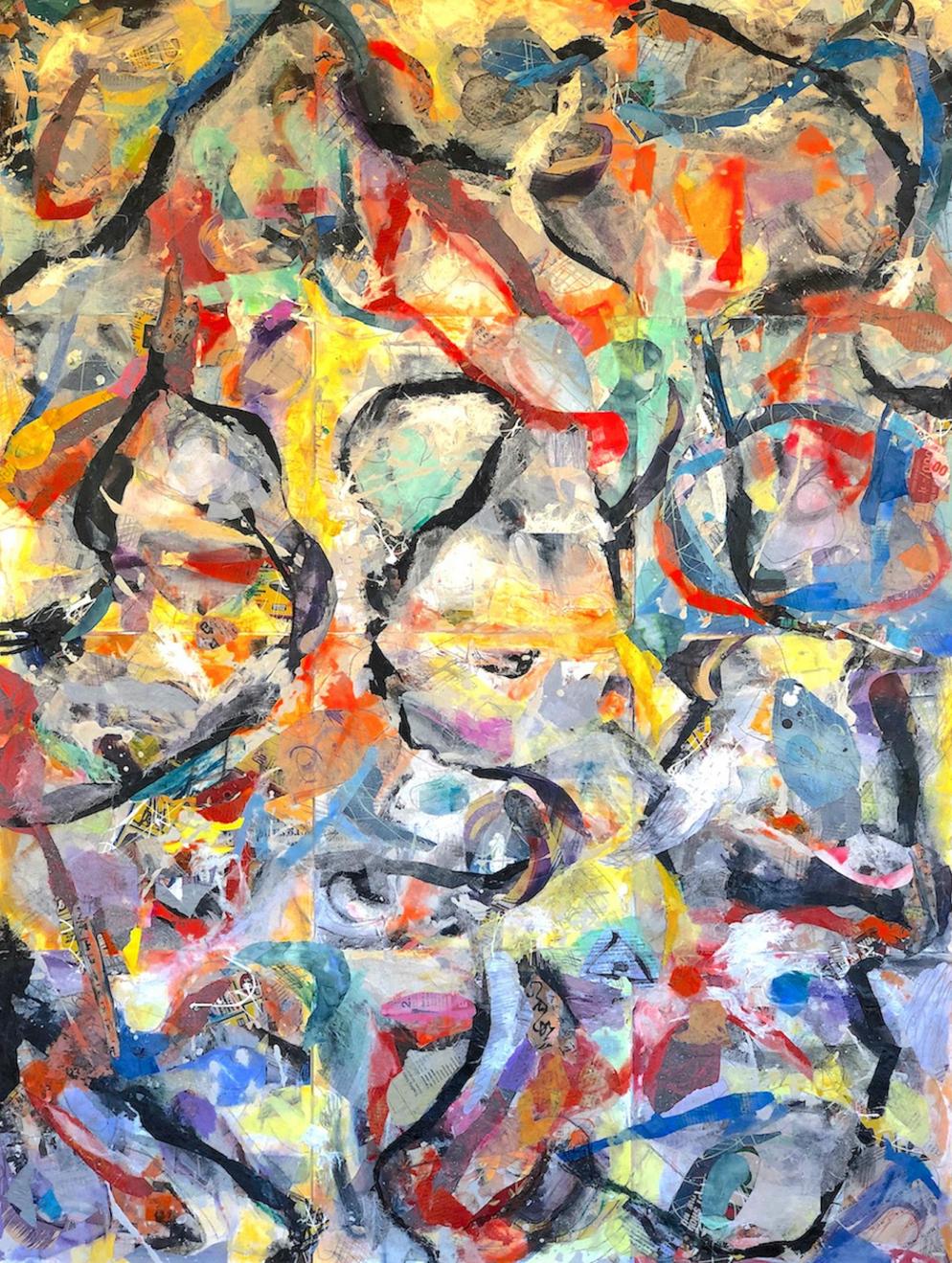
A R T 9
GJ Gillespie heroes and villains
watching the watchmen
Alexandra Clemente
Iwas always interested in the outcasts. The dark side. The things that feel less trite. I like the things that feel cool. So, when I decided to sacrifice my youth at the monastery of encephalic knowledge, I was not going to study the mainstream those cells of the cortex and hippocampus, the circuits involved in “higher cognition,” whatever that means.
Nah, I wanted something that sounded like a My Chemical Romance lament, not a Taylor Swift bop
What sounds darker than inhibitory neurons?
For those that have not sacrificed part of their brain to brain sciences, here’s essential background (and for those in the know, I apologize for my massive oversimplification; if you feel the necessity of taking my Ph D , please inform the degree-granting institution that they have failed): neurons are the main propellers of the “electric circuits” in your encephalon. You have excitatory neurons: the ones that hype the others up You have inhibitory neurons: the ones that keep that excitation in check
It feels trite to say that everything that has ever passed through your mind is electricity made by this circuit of pluses and minuses. The result of tiny things moving across a tiny fence. Ions moving across a membrane of fat That electricity moves through liquid to move more tiny ions across a tiny membrane. And that happens ten hundred trillion million times in your lifetime. If anything goes wrong, if the balance between excitation and inhibition is off, there may be catastrophic consequences like seizures
Just as much as you need the hype neurons, you need inhibitory neurons to keep your electricity in check. It can’t all be positive.
The watchmen of your circuits were long neglected in research. They’re not as big and plump as the excitatory neurons of the cortex, that place of “higher cognition” that makes them more challenging to get to. These smaller inhibitory neurons vary in
1 0 N O N F I C T I O N
shape, size, and molecular makeup. They’re a parade of heterogeneous vigilantes keeping the neighborhood in your skull in order
Studying them in the past was too complicated, so they were just cast aside. But I wanted to study the minuses, not the pluses.
And so, like the head of police of every superhero movie, I toiled away in my windowless room during my PhD Mapping out sightings and activity patterns of these inhibitory watchmen.
Running experiments: if I do this, what do these neurons do in return? Like that head of police, I spent many nights mired in sheer frustration Agony is perhaps the more appropriate word to use here. So many nights without a response, so many received messages that made no sense. It felt like I would never catch them, these vigilantes.
To say I lost years would also be an oversimplification And incorrect I was not lost I was very contained I had entered the monastery of encephalic knowledge and I would not leave until the inhibitory mysteries had revealed themselves to me. But the world spun and spun, and there were no windows in that microscope room I was stuck in the high noon of those white lights
You lose yourself in the tangled mess of neurons, astrocytes, and microglia the cells of the brain. Tangled in the knots of dendrites and axons. Drowning in the molecular markers, parvalbumin and somatostatin, my lovely vigilantes express to make themselves known. Stuck in the gunk that catches in your tiny electrode. Choking because of the debilitating mouse allergy you develop. You’re lost until you realize you are not here to control these vigilantes You can’t catch them That’s the wrong mentality If you think that way, you’ll be here forever.
You’re here to observe and marvel at the capabilities of nature. To humble yourself because these inhibitory neurons know all of you; they control the electricity in your brain and everything that manifests because of it Your fears, your loves, your desire to be known.
But you will never know all of them. And that is how it must be.
You’re here to write just one of the many heroic tales of inhibitory neurons
The story I wrote talks about how these guardians control the
1 1 N O N F I C T I O N
gates of the cortex, that place of higher-order processing. How some of these minus neurons are connected to sensation circuits and some of them are connected to limbic, dare say “emotional”, circuits
How some of them burst, some of them don’t. How those molecular markers that your vigilantes express map onto what they do and who they’re all.
They’re all fascinating We need all of them, these watchmen
My beloved minus neurons, it was my life’s greatest honor to write one of your fables. No matter where life may take me, I will always sing my ode to honor the inhibition vigilantes that keep our encephalons in check
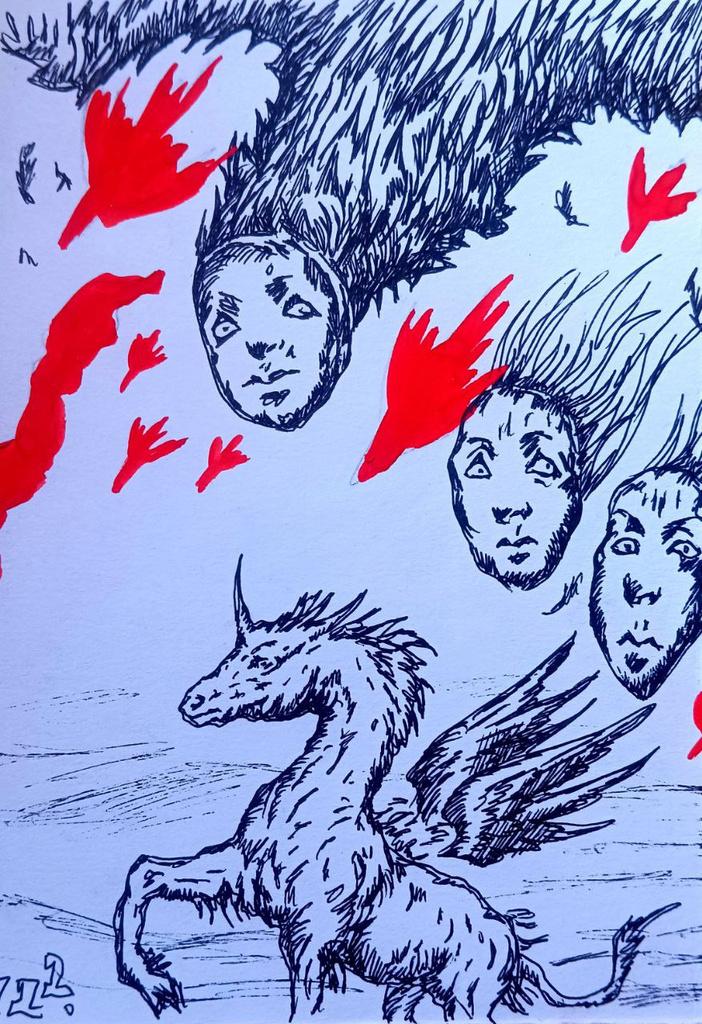
1 2 N O N F I C T I O N Irina Tall (Novikova) untitled
moon river
Ann Huang
You are in love but you don’t wish to be in it. You are losing the nostalgia and sits still, haunted in the barn
Having lived with things to their skins, you rejuvenate to a portion of the deeds you irrigate
You’re him and not him,
gramophone without a voice like a handful of silver frames.
The butterflies see you like a tenor. Some your soft many mirth, past selves who have already left.
Tuxedo shows above the line when you soak in the moon river throughout its veil of discrete love.
1 3 P O E T R Y

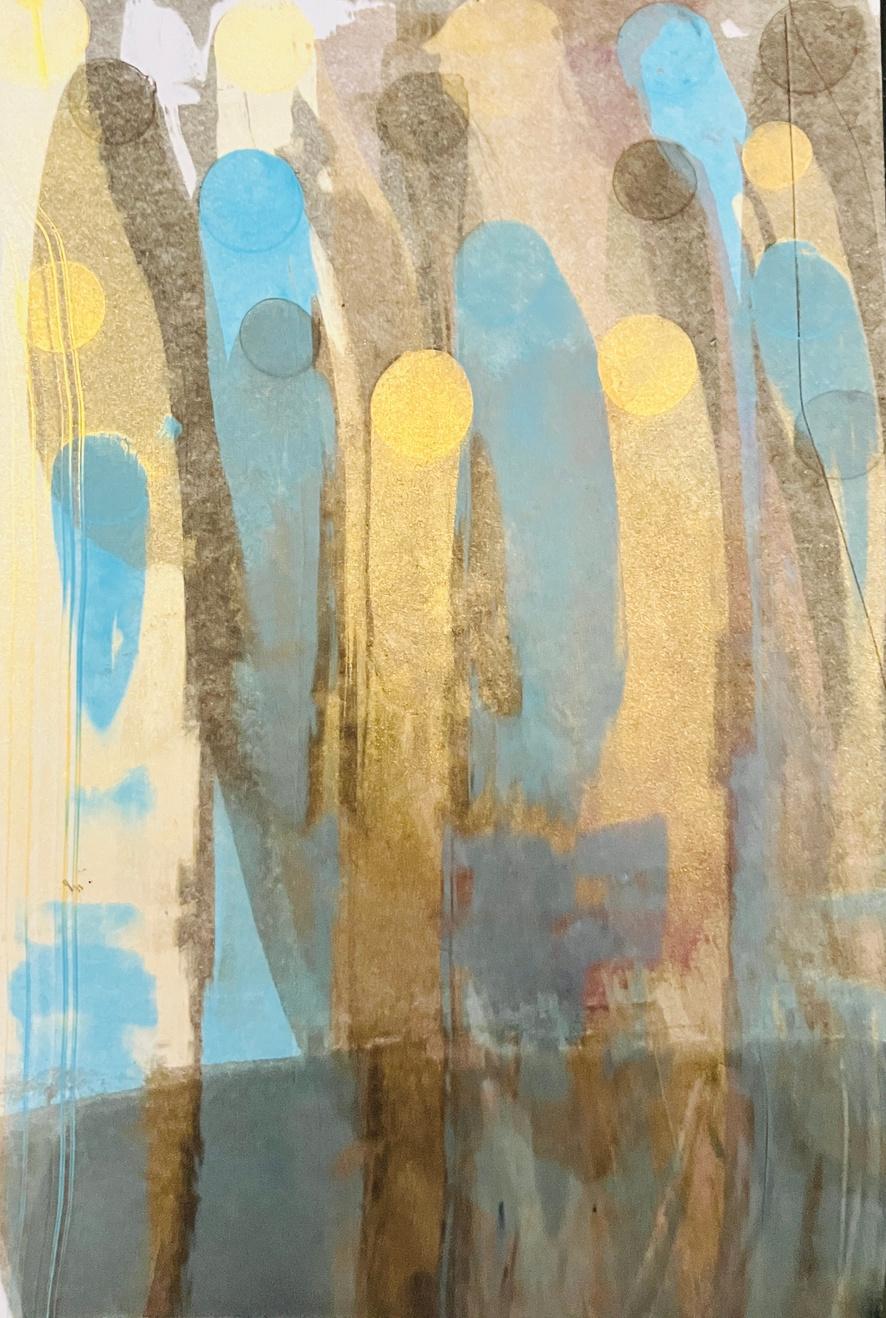
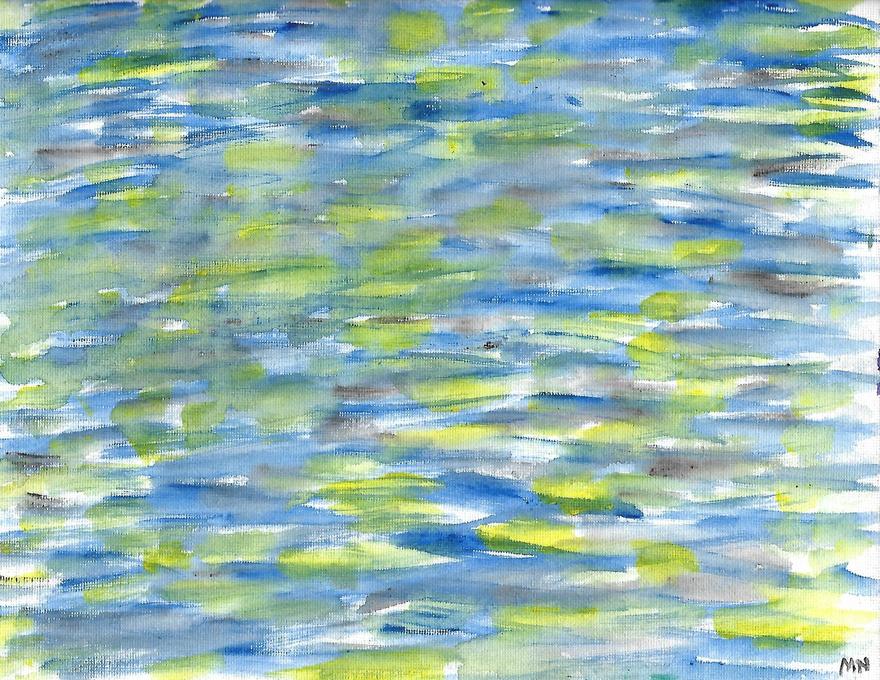
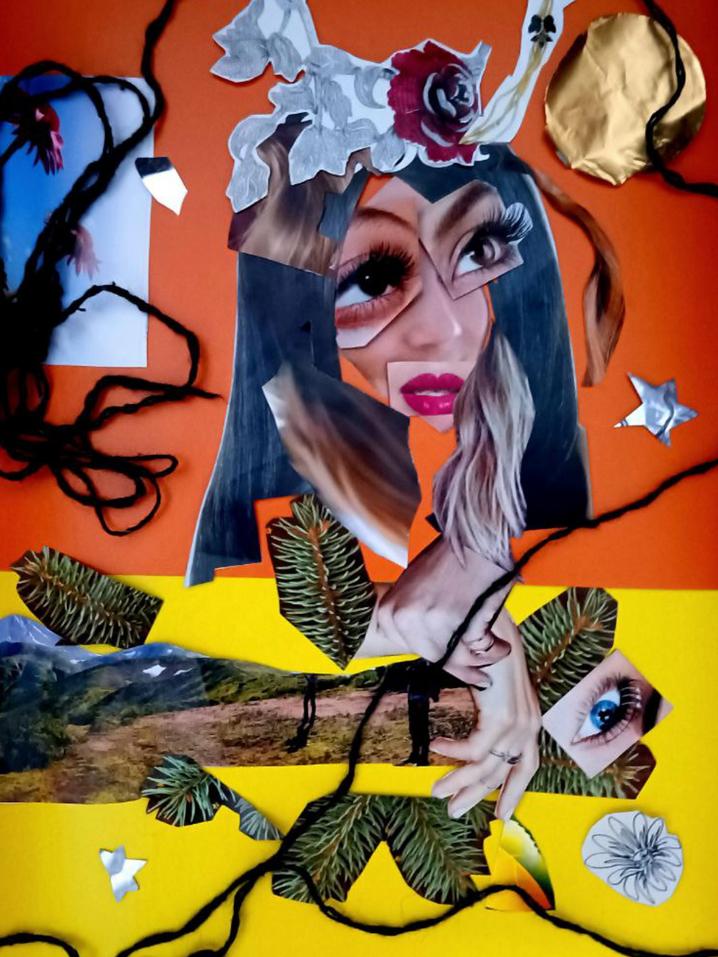 Michael Noonan light on water
Michael Noonan light on water
1 4 A R T
Cyrus Carlson press


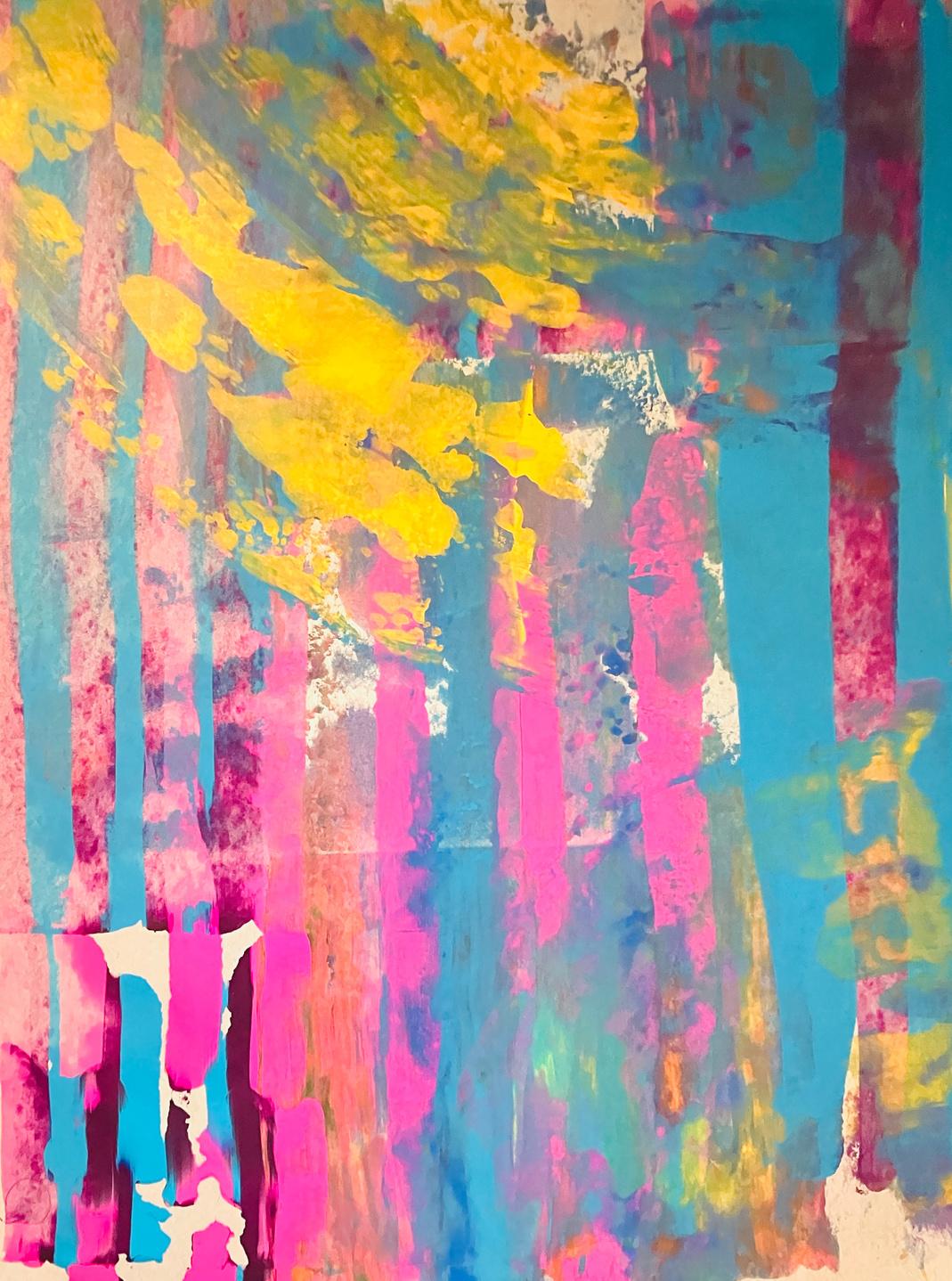
 Rachel Coyne reflect
Rachel Coyne reflect
1 5 A R T
Erika Salvador my memory mural
for me, i knew
Joel Sedano
The moment I wake up, eyes flit, arms unbend indiscernible sounds rip the silence–some solace before blues set like a deep ache in my bones.
Sunshine reduces to grey matter painted across the room, gelling into a sick swirl of assurances I say a little prayer or two, as cortisol unravels my mind’s
acuity Outside my door anxiety now peels yellow off the walls, scratching to catch a glimpse of a figure trapped like a mirror impression split between cracks–yuhnotalright. Did I take my pills? Ovals rattle a greenishorange signal for soul weary like Solange or
1 6 P O E T R Y
Langston: autonomy of mindbody left on E. Out, damned spots, all side effects hit, stretching ocular muscles to their reality limits. I say a prayer–thanks St Koe, bottled smiles makemebetter?
Stomach churns forever & ever, building towards episodic symphony–manic meltdown
1 7 P O E T R Y
the brother and teacher of the neurodivergent
Paul Benkendorfer
he concept of weirdness is an interesting one, especially when we take the time to dissect it. But what is weirdness? Well, simply put, the definition of weird means for something or someone to behave in an unusual or unsettling manner So when it comes to people, someone who is perceived as weird is someone who would make us feel unsettled or uncomfortable. An how we respond to people we perceive as weird determines how we interact or even treat those individuals
Unfortunately, neurodivergent people are often viewed as weird or odd. This greatly influences how neurodivergent individuals are interacted with. The truth is, there is a chasm that exists in the general public’s understanding of the neurodivergent that needs to be bridged Most people who do have experience with neurodivergent people come from personal relationships in the form of family or friends. Such as me and my younger brother who is himself neurodivergent
This lack of understanding has often caused neurodivergent individuals to be the victim of bullying and mistreatment. Even worse, the lack of understanding of neurodivergence has even resulted in the deaths of several individuals. This is why many vehicles used for the transportation of neurodivergent individuals now have signs alerting police and first responders that the passengers are neurodivergent so they can respond accordingly.
Neurodivergence in itself is a difficult concept to understand completely That is because neurodivergence is a spectrum where the behavior of one individual can differ greatly from another. What’s important is that we help people within our society have a better understanding of who neurodivergent people are and how to properly interact with them They can make situations uncomfortable at times, but they are no less deserving of the dignity and respect that should be afforded to all people.
1 8 N O N F I C T I O N
T
When I was an undergrad back in college I met Tony in a class my Freshman year We quickly struck up a friendship and collaborated together during our tenure in college. We went to the gym together and even worked at a local newspaper together. We maintained a close friendship throughout our college careers and even beyond graduation He was a gentle soul intelligent in his own way, witty, and most of all, he showed a great deal of kindness to my Autistic younger brother, Jeremy. Some weekends Tony would come over to my dingy, studio apartment to sit and watch football or basketball games with me and my brother Tony would interact with Jeremy, asking him questions about school or his favorite TV shows. Jeremy isn’t one to answer questions regularly but he would ask Tony to sing or play games. Tony was always happy to do so. Tony treated my little brother like he would anyone else
One day when Tony and I were at the gym, I was approached by an acquaintance of Tony. This was a man I had interacted with before, but never really got to know all that well personally. Evidently, he had a class with Tony and they had conducted research together This gentleman pulled me aside to speak with me The look on his face suggested that this was a manner of great urgency.
When I inquired as to what was wrong, he whispered, asking if I knew just how weird Tony was
There was no malice in his voice, no animosity, no hatred. It was simply just a recognition that my friend in fact did not behave in a manner considered conventional to most. The problem was that Tony didn’t understand personal boundaries He didn’t do anything explicit: he simply placed his phone on a another person’s chest to test a new app on his phone that monitored heart rhythms that he wanted to try it out for himself. Harmless.
I just remember telling Tony’s acquaintance so what, and that I was often told I was a bit weird too. We all can be in one way or another.
He simply told me, no and that I was good. It was just that Tony didn’t understand boundaries or that he told jokes that only he found funny
See, Tony is someone who is also neurodivergent though you would never really be able to tell. It’s the subtle things like sense of
1 9 N O N F I C T I O N
humor or not fully understanding social cues that gave it away. It was what I understood from Tony. It’s what I understood about my experiences with many neurodivergent people It wasn’t that Tony didn’t respect other people’s boundaries; he just didn’t know that what he was doing was perceived as odd or wrong. Worse yet, no one really ever corrected him.
I think we’ve all done something in our lives that made people think we’re a bit odd Some people embrace it and wear it like a badge of honor. They’re weird. It’s who they are and who they want to be. Nothing and no one will change them. But we live in a world where people are judged And being weird is oftentimes met with scrutiny and bullying When I first entered the field of education I worked as a paraprofessional in a school that specialized in Autism. All of these students I worked with were wonderful kids. They loved school and learning. They all had dreams and ambitions. During recess we would play games: tossing a football or playing tag on the jungle gym. All of the kids were full of life and happiness that I don’t think I’ve experienced anywhere else in my life.
And all of them had been the victims of bullying at their old schools before coming to this specialized school All of them
Why? Simple. Their classmates viewed them as weird. At least, that is what my students told me in conversation. These children, the same ones who were full of nothing but love, coming to school every day with a smile gracing their young faces, were forced to leave their old schools because of bullying. And they were bullied because they committed the unforgivable sin of being weird.
One student in particular told me that the reason he admired me was because I treated him like a normal person He was thankful I cared enough to respect him for who he was, and for taking the time to listen to him when he just needed someone to talk to. This is a problem neurodivergent children have been dealing with for decades Being perceived as weird by their classmates causes them to be alienated, ridiculed, and belittled A cruelty no child deserves, and make no mistake, it is a cruelty. No one wants to be alienated and forced to feel unwelcome.
When we refuse to understand people we find to be weird we may lose out on potential friendships with kindhearted people like Tony Make no mistake, that doesn’t mean that we should ignore possible
2 0 N O N F I C T I O N
signs of danger or accept automatically accept being made to feel discomfort. But I’ve discovered that most people are willing to listen People with neurodivergency often want to be treated like anyone else and be accepted. Isn’t that what we all want? To just be accepted?
When we take time to understand those who are different from the rest of us, we often discover there is so much more to people than we expect. Most people don’t want others to feel uncomfortable around them. Sometimes, people being weird are only doing so to feel liked and accepted. There is a lot of love to share and be shared with individuals You can find some of the most rewarding relationships in the most unlikely places. But most of all, it’s about understanding and respecting one another’s human dignity.
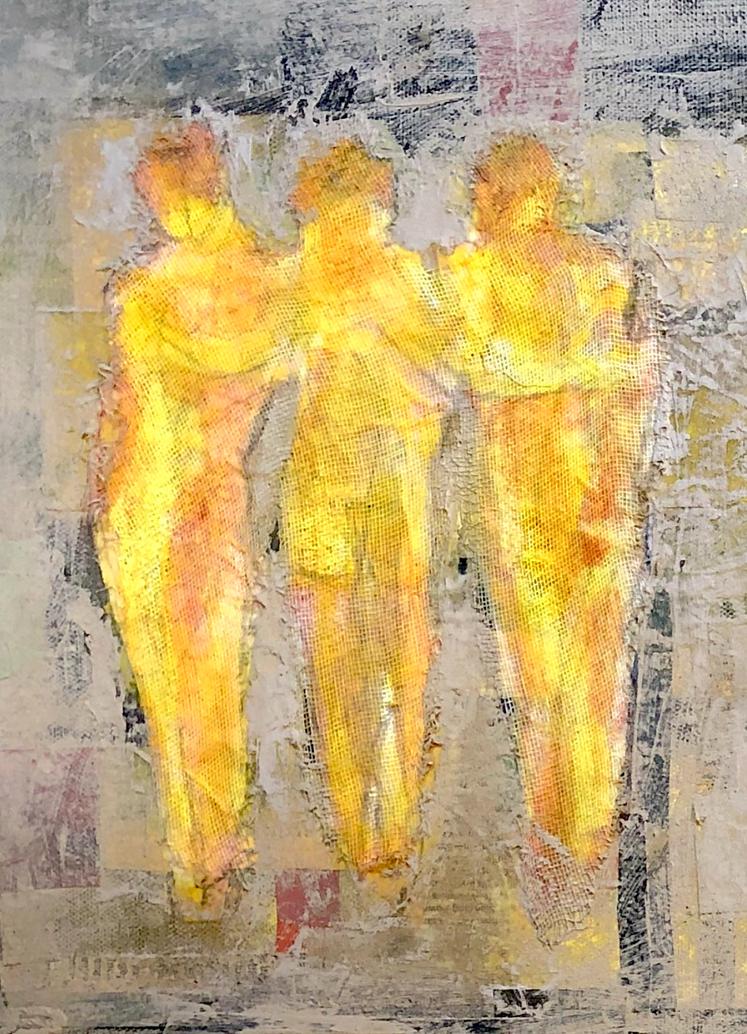
2 1 N O N F I C T I O N
Gillespie
GJ
fresco #3
descartes’ error
Hadyn Adams
Descartes’ philosophy of existence was based on doubt. Considering everything he slowly dismantled the scaffolding of life and realised the evidence to justify our being lay not in sense but in the mind, for behind questioning there is a questioner who is framing the questions This led him to the inference, Cogito ergo sum. Nevertheless I think it is not ‘I’ who makes me be But you, in whose collective consciousness Exists what’s termed my personality, The proof whereof you will yourselves profess Once I have passed the way of all mortality.
2 2 P O E T R Y

A R T 2 3
Tanya Rastogi entropy of art
generalismo
Thom Hawkins
TI. Tercio de Varas (Córdoba, March 1964)
here are few spectators this afternoon, and no matador stands in the arena with the bull. The animal, its black satin fur shining in the sun, stands alone in the dust, wary of the silence The puerta de cuadrilla opens and a man steps out wearing a charcoal grey business suit, black hair slicked back from his forehead. In his left hand he holds the red cape of a matador, stretched wide with a wooden dowel In his right hand he holds a small metal box with a simple electronic button on its face, and a long antenna resembling an estoca, the matador’s traditional sword.
The man holds the cape waist high, its movement a stand-in for his own The bull charges The man holds his ground, points the antenna toward the bull, and presses the button firmly
II. Tercio de Banderillas (Madrid, October 1963)
A few months earlier, this man, José Delgado, sat in an outdoor café with his colleague, José Silva “Man,” he spoke, “did not invent man.” Delgado was fond of using these pronouncements in conversations. He leaned forward, anticipating Silva’s response. José Silva seemed unfazed by the remark. He sat back in his chair at the café table, pushing his grey hair from his broad face “I invented myself.”
“Ah,” Delgado responded. “From your perspective, you are a self-made man. We all are, in our own eyes. We are spectators of our own lives We take action and say to ourselves ‘I did this,’ for I alone made that decision. I consulted no higher power. I am no man’s man I am my own. But the brain tells us otherwise. Neurologically, when we get down into the dust of things, we peek in on the bits and pieces of our higher functions, we find that there is no decision. There is only action that can be traced back deterministically from the firing of a neuron to the connection of a
2 4 F I C T I O N
synapse, to our birth and our conception, to the meeting of our parents, itself an inextricably predictable event where each person is a neuron and their relationship a synapse, and so on and so on through the evolution of mankind and the formation of matter.”
Silva nodded knowingly. “You describe a system, an exploitable system If the brain is merely deterministic, as you describe, I would be unable to make a fool of myself, and yet I can.” He plucked the lemon slice from his gin and tonic. “I can hold this lemon in my hand and imagine it on my tongue. The sourness of it. And my tongue reacts as if I have actually done so The salivary glands are creating a buffer between the receptors on my tongue, and this lemon, which I am still holding in my hand. And now I make the choice to put this lemon to the side.” He tossed the lemon across the small round table toward Delgado, just enough to be out of his own reach. “And now I have made a fool of my tongue, which thought it had a lemon and now it does not. How could I do that if the same brain that produced the saliva also knew that the lemon would never arrive?”
“You think this is an accident?!” Delgado shot back “Just because we do not yet fully understand why we have adapted in a certain way, doesn’t mean we have come to that state through pure chance Most adult male humans are capable of growing a mustache Our closest evolutionary relatives, the chimpanzees and bonobos, do not share that trait. We may not understand the role of that particular trait, but it evolved, which is a deterministic process, resulting in a particular characteristic of humans as great apes.”
“Though neither of us chooses to wear a mustache,” Silva identified. “A choice we have made consciously.”
“Yes, as part of our ecological liberation. This is what gives us our superiority over the other creatures not the mustaches themselves, but the ability to shave them off ”
“The razor as the pinnacle of evolution … ” Silva mused.
“I hope that isn’t it! But our entire evolution has been guided by fate, by the interaction of existing constraints, between individual structure and environmental circumstances ”
“Nature versus nurture?”
“More precisely nature as nurture. It is through our interaction with the environment that we develop.”
2 5 F I C T I O N
“You reject out of hand the nurture aspect?” Silva leaned over the table to retrieve his lemon slice.
“I don’t reject the idea of nurture, but it’s subordinate to nature Nurture is a feature, if you will.”
“Like our mustaches!” Silva raised his gin and tonic up off the table in mock salute.
“Which we shave off to ecological liberation!” Delgado raised his cerveza up into the awning of the umbrella
The two sat quietly for a few minutes, sipping their drinks and watching people walk by on the Calle del Pozo. Silva finally spoke. “The Coué method it is a healing technique There are two principles The first is that we can only think of one thing at a time ”
“That sounds more like a limitation of attention rather than thought. Focus is the bottleneck.”
“Okay, we can only attend to one thought at a time … satisfied?”
Delgado smiled “Quite ”
Silva continued, “Principle two, as we attend to that thought, it becomes true because our bodies transform it into action.”
Delgado frowned. “I don’t see how that follows.”
“It’s simply another way of stating what you’ve already proposed that nurture is only represented as a change of state in nature.”
“But you couldn’t simply wish for something to be true and it becomes so that’s absurd!”
“Control of one’s mind has its limitations,” continued Silva “I cannot think that my drink is full and it will become so. But my mind does have power over my body to accelerate healing, for example, through positive thought reinforcement.”
The mesero chose that moment to emerge from el Café de la Suiza to refresh their drinks The two men paused their conversation until he re-entered the café. “How about control over other’s minds?” Delgado asked. “Is that possible?”
“Certainly You’ve heard of extra-sensory perception?” Silva was relieved that Delgado had finally gotten to the point of why he had invited him here.
“Yes, but I don’t see a neurological basis for it.”
“I’m not talking about magic here. Or even mystery, necessarily but the unknown You must admit that there are unknowns in science, in neurology, even to you. Not unknowable, even just not
2 6 F I C T I O N
yet known ”
Delgado smiled at Silva’s flattery “I can grant that possibility ”
“Oh, thank you! We have senses through which we perceive the world sight, hearing, taste, smell, touch.”
“Yes, yes … ”
“And of course, others, such as the ability to sensetemperature, pain, body position, … ”
“Yes … ” Delgado pushed, impatiently.
“Well, couldn’t it be possible that there are other capabilities that allow us to sense and even interact with our environment?” Silva did not wait for a response before continuing. “You spoke earlier about ecological liberation. About one’s ability to influence or control the factors of one’s existence.”
“Yes, of course ”
“And you have proposed that we evolved this ability, we earned our ecological liberation through a change of state to our nature.”
“Again, yes.”
“Well? Surely, we have not stopped evolving We don’t just cross a threshold into ecological liberation and then BANG ” Silva slammed his fist down onto the small metal table for emphasis.
“This is all gradual, and we continue to evolve. We continue to earn our further ecological liberation ”
Delgado frowned “You’re saying that we’re evolving a power to read minds.”
“That’s just the beginning. You’re thinking too passively. We have evolved the power to project ourselves into minds. Do you believe this?”
“Yes I mean, I’m looking into something similar in my line.”
“Where are you with your program?”
Delgado smiled with pleasure at Silva’s interest. “I’ve found the locus of aggression in the amygdala and ” He sat up straight and leaned forward over his drink. “ … I’ve managed to implant a small device to stimulate it remotely. In cats and rhesus monkeys.”
“You’ve got mad monkeys?” Silva joked.
“I’ve got some I’ve made mad, and ones that started out so that aren’t any longer,” Delgado responded, seriously “There was one monkey in particular that displayed aggressive behavior. I put an implant in his brain that would inhibit this behavior when
2 7 F I C T I O N
electrically stimulated and gave the other monkeys access to a remote trigger.”
“I can think of many applications for this technology at family gatherings! You’ve achieved direct stimulation of the brain, but you also mentioned a correlate to extrasensory projection?”
“I did,” Delgado paused, unsure whether to continue, weighing his trust in this man he knew only by reputation Then, deciding that this kind of exchange was exactly why he’d invited Silva to have this discussion, he continued. “Next is indirect electrical stimulation of the brain. Focused magnetic pulses to disturb the brain’s electrical field To influence the brain ”
“You believe me after all? That what I do is possible Reading and transmitting thought electricity could be the carrier.”
“I believe that it could be possible, yes. That is why I wanted to have this discussion.”
“And what do you need from me?” Silva asked “Proof. A proof of concept.”
“Very mysterious. You have a target?” It didn’t quite sound like a question.
Delgado glanced cautiously around them “Not to be spoken about in an open forum.” Although no longer as dangerous as it was the first couple of decades after the war, people still occasionally disappeared after conversations like this. In fact, it was better to talk in the sunlight so it didn’t appear you had something to hide.
“Spoken? You are too late, my friend. You’ve had the thoughts. You invited me here specifically because of these capabilities. Surely you assumed I would take a peek inside your magnificent mind ”
Delgado looked surprised, then concerned Was it true? He suspected Silva to be a fraud, but at the same time, was desperate enough to extend this invitation and to confide in him thus far. The potential upside was worth the risk
“You should trust me,” Silva urged “I know you are not sure, but you have no choice.”
“No choice?”
“None of us have any choice, according to you!” Silva replied, boisterously
Delgado smiled. “Here we are, the two foremost experts in
2 8 F I C T I O N
control of the mind, neurologically and psychologically, confronting a power that neither of us can comprehend the power of a single mind over all others.”
“A master manipulator, to be sure,” Silva hedged. “But I would hesitate to call it mind control. Men like … ” He paused, out of deference to Delgado’s paranoia more than any other reason “Franco,” he whispered, “merely understand that public opinion is volatile and easily manipulated.”
“We,” Delgado quickly added. “We ourselves are easily manipulated ”
“We are still human, despite our ecological liberation.”
“We understand enough to know that we’re being manipulated. And yet … ”
“Powerless,” Silva finished his sentence for him Their sentence
The two men continued from their merged thought into a union of thought filled silence. The tinkling of glasses being washed in the café. Mopeds buzzing down the Calle Caretos. Children released from school on a sunny afternoon
“Natural history teaches us that when underdeveloped brains are in charge of great power, the result is extinction.”
“And yet we still hope. And that is what makes us powerless. We believe we still have freedoms that can be taken away That is why we do not fight To fight, we must have no hope ” For once it was Silva making the pronouncements.
Delgado nearly cut Silva off with an impatient reply. “I’m low on hope, and I need your help.”
“Because your approach is limited An implant is out of the question.”
“For certain,” Delgado whispered, urgently.
“And your extension with focused magnetic pulses?” Silva asked.
“The range is still far too short to be effective on such a man ”
“He is very well protected, of course.” Silva sat back in his chair, his hand on his chin. He stared off beyond Delgado’s left shoulder.
“You need my help to access him more… remotely?”
“Yes,” Delgado replied through his teeth, sensing that Silva just wanted to hear him ask “I need help ”
“I am a healer, my friend,” said Silva gently.
“You would not call what this man does an illness?”
2 9 F I C T I O N
“He is a cancer on Spain, to be sure,” Silva acknowledged.“But that type of cure is well outside my purview.”
“I can guide you I have the map I will be your ” Delgado tried to recall the word used in Silva’s book, the book he turned to, he now realized, in desperation. “ … I will be your psychorientologist.” The words stumbled from his lips.
“It took me decades to develop my program I appreciate your situation, but all I can offer is to help you, the individual ”
Delgado finished his cerveza, and banged the bottle back down on the metal table in response to Silva, whom he could no longer look in the eye
“Your program,” Silva asked, “what is next for it?”
III. Tercio de Muerte (Córdoba, March 1964)
Delgado holds the cape waist high, its movement a stand-in for his own The bull charges He holds his ground, points the antenna like an estoca toward the bull, and presses the button firmly.
As quickly as he presses the button, the bull’s short charge slows to a stagger. It recovers, and circles, bewildered. Delgado ripples his cape The bull charges again, Delgado presses the button on the stimoceiver, transmitting the signal to the implant in the bull’s brain. The bull stops again, looking more stunned than inhibited. It had taken many bulls, many operations to get to this point, and this was not the end There would be one more, one who could not be implanted, but who must be stopped.
Delgado stands over this penultimate bull, which he has privately nicknamed Generalísimo, his teeth bared and triumphant hip cocked, right foot out and to the side He flourishes the cape, raises the stimoceiver antenna high, and takes a bow
[This story is inspired by the lives of José Delgado, Yale professor of neurophysiology notable for his research on mind control and electrical brain stimulation, and José Silva, who experimented the nature of psychic abilities and brain wave activity.]
3 0 F I C T I O N

A R T 3 1
Christopher Woods sand stairs
runs in the family
Gerard Sarnat
She who lovingly Pampered my daddy
Shared only with me He looked like a frog
Fast forward half century+ Now afflicted with CFS/ME
(Chronic Fatigue Syndrome/ Myalgic Encephalomyelitis)
Which so far has no known Etiology therefore treatment
We wish her Prince Charming Could awaken Sleeping Beauty
But so far Gerardo you too are Appearing sadly to be damn dud
Toad leaves partner to travel road alone.
3 2 P O E T R Y
confessions
Parker Rose
I smother my miseries with unorthodox purpose, stomp out the tear-soaked dirt, feet weary from pointless travel. Clutching my anxious heart, I whisper everything will be okay and say that on this journey, we’ll find the reason it beats from time to time
I stand in the mirror, meticulously crafting my smile for the day. Then I walk out the door, and fear I’ve already lost it
3 3 P O E T R Y

3 4 A R T
Kirby Wright melancholia
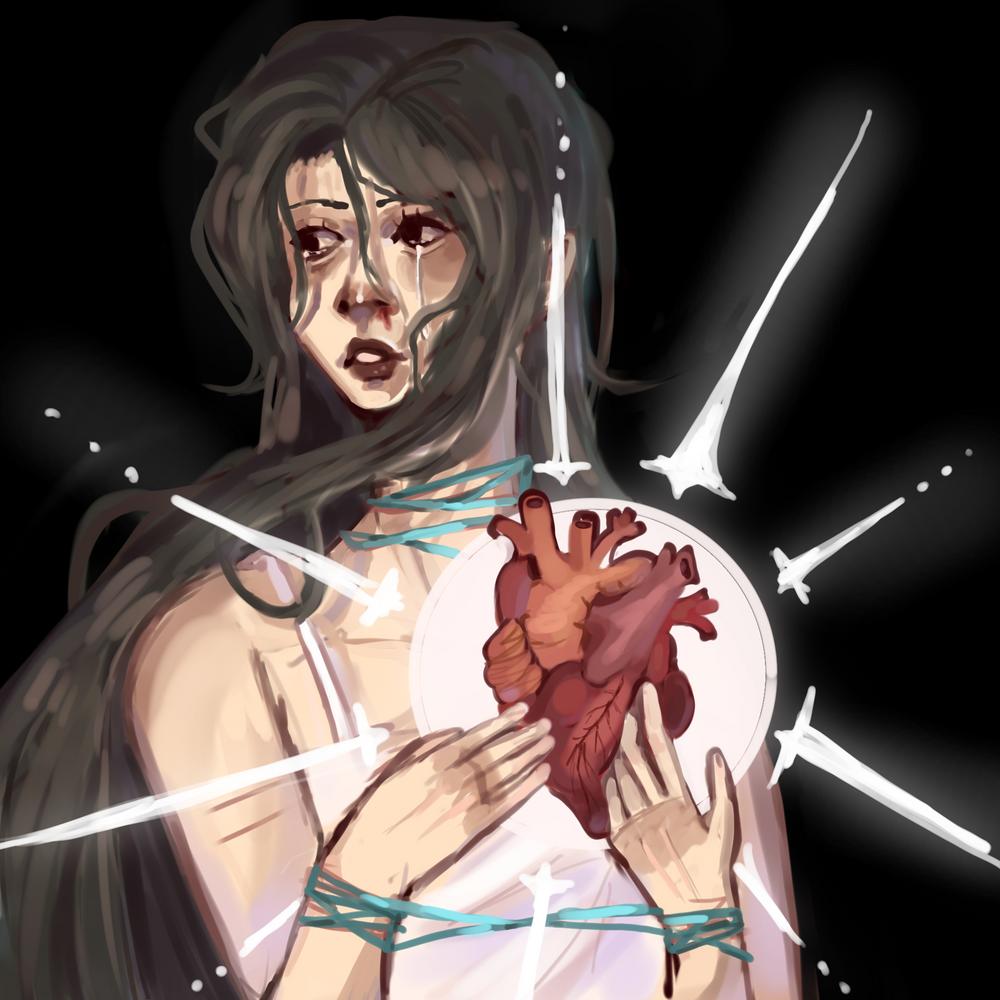
3 5 A R T
Raya Siddique protect your heart
fruit plate
Aradhya Saxena
I have learnt early on, That my body is not my own, Soft fingers straining towards broken glass, A dwindling existence in purgatory; home.
My memory is blotchy, burnt hands and boiled pasta, giggling over creaking metallic slides in the dark,
Black hair blanketing me, wrapped around my throat; Bloody lips and fingertips, Digging into collarbones.
Salty tears run over long fingers, as they force pulpous strawberries down my throat, sweet juice choking up my lungs, until there’s no more.
They burn in indignant resistance, the only organs fighting back in my empty shell of a body, I have deserted me, a collapsing star in an empty galaxy,
Rings of cartilage crush against hands larger than my face, My lungs, they fight anyway, Expanding, contracting, contracting.
Sickly sweet plum and glazed apricots, stain my childhood bedroom walls, Juice spilt on soft, clean cotton sheets, Snot dribbling into fruit bowls
3 6 P O E T R Y
in sticky, nectar dripping, down my nose, my neck, over my eyes, the insides of my thighs.
I have left my heart in the fruit plate, Carved cleanly out my chest, Bones breaking and ribs snapping, Beating organ pulled hastily out the cavity, A tangled mess of torn arteries and veins left in its wake.
I have left my heart in the fruit plate, Pulled carefully with artful precision, and an unwavering painful grip; It is covered in sweet summer sugar, and small, alive writhing things
I have left my heart in the fruit plate, it sits delicately between the cherries and the plums, A smear of bright red on impersonal white sheets, crushed, fruit bits block every opening.
I have left my heart in the fruit plate, It is infested with maggots now, soft rotting flesh and fruit, permeate these halls.
I have left my heart in the fruit plate, my body on a honey-drizzled bed, the last time I felt safe, I was seven.
I have left my heart in the fruit plate, my soul in an empty haunted house, I have left my heart in the fruit plate, I am going to get it back now.
3 7 P O E T R Y
tentacles
Heather MacDonald
The miniature flashes of light were magical. I was transfixed as I watched the soft clicks of incandescent twinkles explode throughout the tea room. The fairy lights danced around the tables, through people's hair and up to the ceiling It was as if the room was flooded with magic dust and fireflies. ***
I mentioned the lights to my two friends, absorbed in their own conversation, who were enjoying afternoon tea with me They seemed confused and said they couldn't see any lights at all. Had they known I had a history of bipolar disorder they would have been alarmed. But it was the early eighties, and I did not disclose my mental health background to friends or employers I held my tragic story close to my 28-year-old heart, always with the fear of being judged, held back from advancement, or even fired.
I was not at all concerned with what I was seeing, and in fact felt bad for what my friends were missing They had clearly not been chosen by God or the Universe to experience the beauty and tranquility I was enjoying in this moment.
The past year had been so lonely and hard. Struggling with the first year of a divorce, managing a high profile, stressful job, and digging out from a mountain of debt
Now, those hard times were behind me. Life was lightening. I had felt the welcome tentacles of a new-found sense of well-being embracing me in the past few days.
After our tea, I said good-bye to my friends I walked home, feeling lighter than air. As I changed and freshened up, I admired my reflection in the hall mirror. Wow, I looked better than I had in weeks! I was headed to the home of my best friend for dinner.
My bus ride was magical After months of personal turmoil I felt absolute peace wash over me. A dense, heavy fog had been lifted from my life. I noticed a small child a couple of seats up the aisle. We smiled and had a deep connection. I admired the brilliant gold
3 8 N O N F I C T I O N
and orange of the late afternoon Regina sky. For the third time in recent days I heard the voice of God whispering in my ear, telling me how much I was loved That I was finally destined for great things. My suffering was finally over.
Little did I know I was steeped in anosognosia, a medical term I was to come to understand many years later. It describes people's lack of insight or ability to perceive the reality of their own mental health conditions and symptoms.
I had known my friend Carol for only a few years, but she knew me better than anyone. She picked up on my elevated mood immediately She noticed I was more animated than usual, speaking very fast, almost giddy.
“How are you feeling Heather?”
“Fine. Fine. Better than ever, actually.” I shrugged off my coat. “I think I've finally turned a corner with my divorce blues, Carol Life is great!”
She signaled me to the couch. “Hmmm, that's good.” She let out a worried sigh as I sat down beside her. “And, how have you been sleeping Heather?”
“Oh, I don't need much sleep,” I replied “Probably about three to four hours a night. Look at me. I feel great, and I'm not even tired!”
Carol poured me some tea. “You know you can trust me, right?”
“Of course, I answered,” my curiosity piqued
“I have an important question that I want you to think about and answer as honestly as you can.” She paused and took both of my hands in hers. “Have you experienced anything unusual lately? Seen or heard things that no one else has?”
I took a deep breath. How could she have known? With a sense of wonder, I shared my experience of the soft clicking lights and of hearing the comforting, loving voice of God.
Carol continued to look tenderly and directly into my eyes
“Heather, based on what you have told me about your past, I think you are headed for a bipolar episode. I'm worried you haven't been sleeping much, and you've already told me that it’s not good for your mental health You are not making sense, and you're acting high This elevated mood of yours is dangerous ”
“Carol, I'm fine.” Why couldn't she just be happy for me? In
3 9 N O N F I C T I O N
frustration I asked her, “Is it OK if I have a cigarette?”
“Disappointing that you've started again. But sure, go ahead.”
I lit up and took a deep drag, while Carol went in search of an ashtray.
She sat down beside me. “Carol, you don't have to worry about me. Lots of people are chosen, like me, to see and hear things that most people aren't lucky enough to experience ”
“Heather, how long have you been feeling this way?”
“Just a few days.” I stood up and began to pace the room. “It's really no big deal. I just saw some lights flickering in a restaurant this afternoon And God's been talking to me a little bit this week He talks to everyone you know Most people are just not as tuned in as me.”
Carol's eyes welled up. “Sit with me.” She patted the cushion next to her. Once more she took my hands in hers. “Heather, I am not a doctor, but I really think you are getting sick Do you want to end up in the hospital again?”
I yanked my hands away and stood up. “Of course I don't. I told you I'm fine. Don't worry about me.”
She took me in her arms and gave me a long, lingering hug
“Heather, how long have we known each other?”
“Five years or so.”
“And I am the only one in town you've told your whole story to, right? About your mental breakdown ten years ago? And your six month stay on the psychiatric ward in Toronto. Right?” I nodded.
In a flash, I had memories of strait jackets, over medication and shock treatments. And, the hopelessness of living on a psychiatric ward for several months came back to haunt me
I was only 18 when I had my first manic episode in Toronto I remember hearing the voice of God on a rainy night, as I sat alone in the rooming house I was living in. Later that night I shared what I was experiencing with a man I had recently met His name was Tom and I was falling hard for him I recall him telling me he had to go away. He told me I was getting sick, and to always remember I would get well. He was like a human God to me. So kind and loving and handsome. I remember being picked up the next day by the police I had found my way into several high rises and had been knocking on apartment doors, asking if Tom was there.
4 0 N O N F I C T I O N
When I was taken to hospital, I was completely hysterical, screaming until I was medicated and placed in a strait jacket. At first, the medical professionals thought I had overdosed, or had some kind of chemical imbalance. The next theory was that I had schizophrenia To further complicate my medical situation, a few weeks after my admission my mother suddenly passed away from an aneurysm at the age of 38. Because of my unstable emotional state, I was not told of her death for a few months. I was still not improving after four months On the urging of my family, I consented to electroconvulsive therapy, also known as shock treatment Though highly controversial at the time, I believe this was a turning point in my recovery, as memories of the previous year of personal and family trauma were blocked forever. The memory of the anesthetic needle being injected into the top of my hand will always haunt me Almost five decades later, I still feel the coolness rushing through my body as the sodium pentothal took effect.
After twenty-eight shock treatments I was diagnosed as being bipolar and placed on the drug lithium, to which I responded remarkably well. After being in hospital for six months, I was released and started college in Belleville Ontario in the Broadcast Journalism Program. It took another several months to get fully back to myself, with the care and love of my father and ten-year-old sister For nearly a decade now my life had been normal and relatively stable and I had an established career in small market broadcasting.
As I sat quietly, staring out the picture window, Carol interrupted my reverie
“Heather, I have seen these delusional patterns with another friend you haven't met. I think I know what the beginning of a manic episode looks like. I want you to call your psychiatrist right now and get an appointment for tomorrow morning Let them know at work you won't be coming in. You are staying here tonight and I will take you to your appointment.”
I peered out the window as I reflected on what she was telling me. Although I was holding fast to my delusions, which were in fact my reality, and my welcomed sense of renewed well-being, a small part of me wondered if Carol might be right. The last thing I wanted was a full-blown manic episode. I knew from bitter experience that a
4 1 N O N F I C T I O N
case of mania could easily steal a year from my life.
Carol was my most treasured friend, and the most grounded person I had ever met I decided to trust her
She interrupted my train of thought. “Maybe you just need some rest, some sleep medication and an adjustment of your lithium.”
As it turns out, my wise friend was right. My psychiatrist concluded I was at the beginning of a manic episode and I was lucky to have caught it early I was admitted to hospital and I bounced back to reality within a few days. I was released within a week, after some counseling, shifts in medication and lots of rest. Even though I was independent and doing well with my work, it took several months before I felt whole and balanced again
This experience marked a crucial turning point for me in managing my bipolar condition. For the first time I had insight into my own illness. This forever improved my ability to trust those around me in recognizing the symptoms of the onset of mania Also, I learned to be suspicious of feelings and emotions that felt too good to be true.
Today, it's been over thirty years since I have experienced delusional thinking and mania A few times throughout my life I have been fortunate to have had trusted friends and family members help talk me down to earth from delusional thinking. Caring professionals have also had a major impact on my sustained and sound mental health, most notably a highly insightful and compassionate Vancouver psychiatrist who counseled me for 20 years, starting in 1993.
Now, at age sixty-four, I am still taking lithium, albeit a very low dose According to my doctor, bipolar has been known to burn itself out as age advances While choosing to believe this, I remain vigilant, especially in times of stress, to do everything I can to ward off a bipolar episode.
Bitter experience has taught me that yielding to the seductive tentacles of mania can wrap me in fake euphoria and well-being that will take me nowhere good. I will forever be indebted to my dear late friend Carol. She helped me to accept my limitations and gain the insight I needed to avoid becoming seriously mentally ill for a second time in my life She was my true life angel
4 2 N O N F I C T I O N
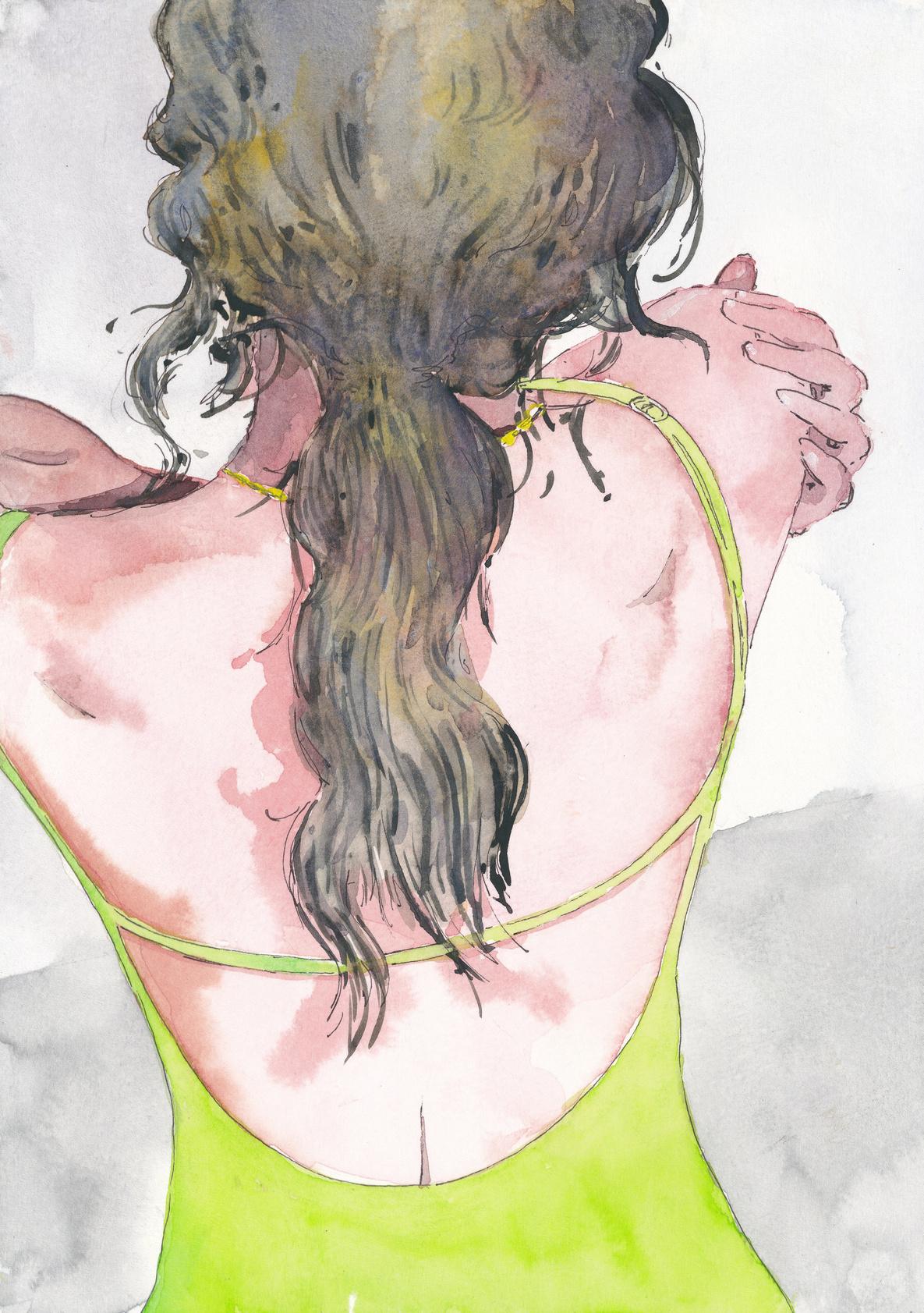
4 3 A R T
Lex Lee vulnerable
bodies and butterflies
Taiwo Hassan
once, i heard that flowers aren’t the only destination for butterflies on a journey to quench their hunger, that the human skin carries as much wonder as the compact petals in marigolds and to these colours in flight, sweat is another synonym for nectar. this is where i condense into a sea of questions about what a monarch butterfly perceived on my palms. how do they trace the tracks of sweat on every blob marked by these veins? do they see a fresh type of freedom on this endless brown or do their wings find a special canvas in its roughness?
can they harvest bloom in broken boys, making every short hair adorning their several pores into little lights? can they weave their childhoods into mementoes of beauty? their wide eyes, can they split it into an open heart into witnesses in the making of a miracle, even only for a split second?
4 4 P O E T R Y
or are these flying mementoes creatures on a quest for nothing but quick fixes in sweat and blood, in skin and furs, in frail bodies and fleshy cages, is their nature proportional to the innocence they ooze? do their skies stretch into blue too? riddle me this how many countless souls have my body sheltered? has this sheath sharpened their bluntness? underneath their rawness, do they carry a cosmos of secrets and strangeness? or are they also just butterflies finding flowers in bodies like mine?
4 5 P O E T R Y
CONTRIBUTORS
GJ Gillespie is a collage artist living in a 1928 farmhouse overlooking Oak Harbor on Whidbey Island, WA A prolific artist with 20 awards to his name, his work has been exhibited in 64 shows and appeared in more than 140 publications.
Dorian Winter is an emerging artist and writer from Perth, Western Australia His art & poetry are forthcoming or have appeared in many magazines He is also the founder and editor-in-chief of Antler Velvet You can find him at dorianwinter com, or maybe at a French bakery somewhere
Dr. Michael Salcman is a poet, physician and art historian who was born in Pilsen Czechoslovakia, and is a child of the Holocaust and a survivor of polio The former chair of neurosurgery at the University of Maryland, he is the author of 200 scientific articles and six medical books
Alexandra Perez writes about her experiences as an immigrant and a scientist. She holds a Ph.D. in neuroscience from the University of California, San Francisco, where she studied perception and epilepsy Her favorite brain region is the Thalamic Reticular Nucleus She is working on an essay collection exploring her experience migrating from Venezuela to the United States. She lives in the Bay Area, where she always wears a sweater. Her Instagram is @aleclepe.
Irina Tall (Novikova) is an artist, graphic artist, illustrator She graduated from the State Academy of Slavic Cultures with a degree in art, and also has a bachelor's degree in design She enjoys writing fairy tales and poems, and illustrating short stories.
Ann Huang is a multilingual Chinese American poet, filmmaker and visual artist based in Newport Beach, CA who is Ephemera’s June 2023 Poet Her poetry has been featured in many magazines
Cyrus Carlson is a 15 year old abstract painter from the Midwest.
Michael Noonan is from Halifax, Yorkshire He won a runners up prize for a drawing in a competition run by Arts and Illustrators Magazine in the UK, and his own painting can be seen on the cover of a volume of his stories, entitled, Seven Tall Tales.
Erika Salvador, born and raised in the Philippines, is an incoming first-year at Amherst College Her visual art, usually using oil, watercolor, and ink, are featured in many magazines She also explores film and phone photography from time to time and is an avid reader of free verse poetry. She posts her art @bodeganierika.
Rachel Coyne is a writer and painter from Minnesota
Joel Sedano is a trans non-binary disabled poet, performer, photographer, and scholar based in the Bronx, New York They are Chicanx reconnecting to their Indigenous roots in Western Guanajuato
Kirby M. Wright was born and raised in Hawaii. He was a guest lecturer at Trinity College Dublin.
C O N T R I B U T O R S
Paul Benkendorfer is an adjunct professor of English as well as a teacher who specializes in teaching reading and writing skills to special needs youth He is also the caretaker for his own autistic brother, Jeremy, who has served as the inspiration for many of Paul's poems and short stories. Paul holds a B.A. from the University of Arizona and a Master’s from Johns Hopkins. He is due to complete his MFA in Fiction at Drexel University in May 2024. When Paul isn’t writing, he takes care of his two rescue dogs
Hadyn Adams has spent over four decades working in education initially in positions in the U.K. and subsequently in the near and far East. Creative writing has been a habit throughout his life and he has self-published three novels and had a few poems printed in various magazines and anthologies
Tanya Rastogi is an artist and writer from Bettendorf, Iowa. She is the founding editor of The Seraphic Review. When she's not hunched over a screen, Tanya enjoys playing the flute and watching video essays
Thom Hawkins is a writer and artist based in Maryland His video art and drawings have been displayed at exhibitions or in performances in Baltimore, Philadelphia, and New York. Thom also appeared with the Baltimore Improv Group, Ignite Baltimore, and on the Stoop Storytelling podcast.
Christopher Woods is a writer and photographer who lives in Texas He has published a novel, a prose collection, and a book of stage monologues. He received residencies from Ucross Foundation and the Edward Albee Foundation, and a grant from the Mary Roberts Rinehart Foundation.
Gerard Sarnat is widely published internationally in print and online His publications include San Francisco Magazine, The Los Angeles Review, and The New York Times; as well as by Yale, NYU, Northwestern, Brown, Harvard, Stanford, Dartmouth, Penn, Johns Hopkins, Columbia, and Chicago presses Gerry is a Harvard College and Medical School-trained physician who’s built and staffed clinics for the disenfranchised as well as a Stanford professor and healthcare CEO Currently, he is devoting his energy to climate justice, and serves on Climate Action Now’s board
Parker Rose, born in Concord, North Carolina, is a sophomore at Anderson University studying Spanish and English literature He is interested in classic literature, art, and language His favorite genres to read and write are poetry and horror short fiction In addition, Rose is currently writing a novel in verse titled Forest of Profanities and hopes to see it published in the future.
Aradhya Saxena loves learning Whether that be in the form of science, or literature, or complex analysis of a piece of media, she's a willing acceptor Her finesse or skill at the subject is irrelevant in terms of her interests. She adores all her fields of interest regardless.
Heather MacDonald loves to write short non-fiction and realist fiction A resident of British Columbia, she has enjoyed a rich career in broadcasting, recruitment, and telecommunications management
Taiwo Hassan is a writer of Yorùbá descent, a poet and a vocalist. A 2x Best Of The Net Nominee, his poems have appeared in a multitude of magazines. He's also an undergraduate student of Demography and Social Statistics at Obafemi Awolowo University, Ilé-Ifẹ, Osun State, Nigeria His first chapbook, Birds Don't Fly For Pleasure is published by River Glass Books
New Latin for "the brain," Encephalon is a youth-led art and literary journal It is devoted to publishing and honoring the voice, craft, and originality of aspiring writers, artists, and scientists. We publish original fiction, non-fiction, poetry, research essays, and all forms of visual art.
Established in 2023, the reputation of Encephalon arises from its place as a home for the intersection of neuroscience-based work and other academic disciplines. Our award-winning editors review submissions from more than 50 countries. Their voicedriven pieces ultimately create vibrant issues that attract over 20,000 readers worldwide. In addition, Encephalon strives to combat "neurophobia," celebrate neurodiversity, and raise mental health awareness by fostering active discourse for a general audience. With a team-based approach towards multidisciplinary publication, there is something here for everyone to enjoy.
ABOUT THE ENCEPHALON JOURNAL
FICTION
Bill Teitlbaum
Sarah Somerset
Aisea Solidum
Thom Hawkins
NONFICTION
Heather MacDonald
Paul Benkendorfer
Andrew Nickerson
Alexandra Clemente
POETRY
Gerard Sarnat
Hadyn Adams
Michael Salcman
Ann Yu Huang
Jeahnelle Garcia
Taiwo Hassan
Jonathan Fletcher
Parker Rose
Aradhya Saxena
Joel Sedano
Casey Loken
Christen Lee
ART
GJ Gillespie
Dorian Winter
Rachel Coyne
Tanya Rastogi
Christopher Woods
Michael Noonan
Cyrus Carlson
Erika Salvador
Lex Lee
Raya Siddique
PHOTO
Kirby Wright
Irina Tall
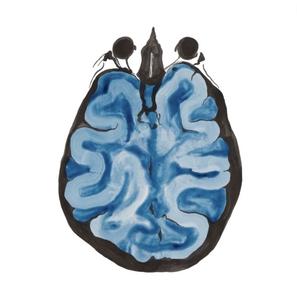










 Michael Noonan light on water
Michael Noonan light on water








